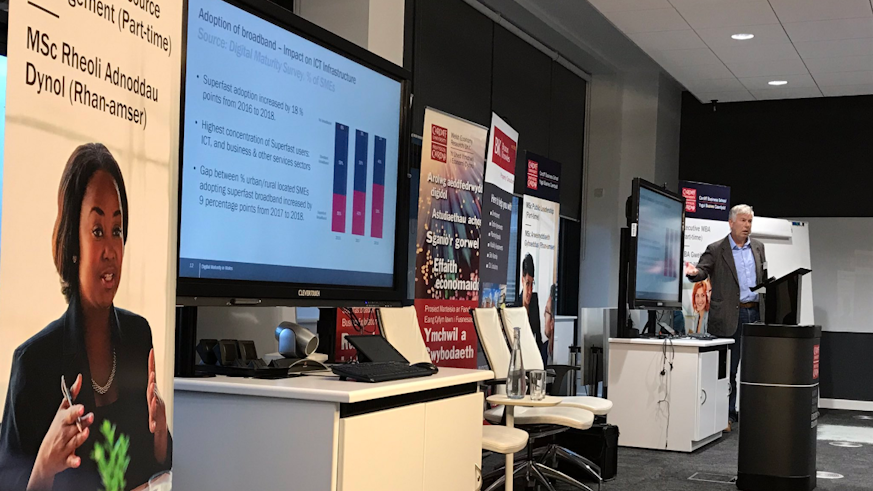Can Welsh firms gain an edge from digital tech?
24 September 2019

Academic, industry and policy-maker perspectives on Wales’ SME digital infrastructure were the focus of the latest event in Cardiff Business School's Breakfast Briefing Series on Wednesday 24 September 2019.
Professor Max Munday, Director of the Welsh Economy Research Unit (WERU) at Cardiff University, together with entrepreneur and new technology advocate, Giles Phelps and David Elsmere, Partnership Manager at Superfast Business Wales, explored the issues and opportunities for Wales’ digital future.
Professor Munday got proceedings underway by explaining that there are innovation and productivity potential in ICT, but how small to medium-sized business and micro-businesses might be resistant to adoption.
“These organisations often perceive the risks involved to be greater than the rewards,” he said.
Professor Munday outlined how he and his team of researchers at WERU are working together with Welsh Government to develop an evidence base to which seeks to examine and understand digital technology use in Wales’ SMEs over time.

“As far as possible, the Digital Maturity Survey is longitudinal. We’re trying to look at what actually changes through time. So, for example: Is there evidence of more firms are taking on cloud applications? Is there evidence that more firms are engaged in e-sales?”
“Those are the kinds of questions that the DMS is seeking to answer,” he added.
Last on the list
Next up was Giles Phelps, who focused his discussion on infrastructure, investment and skills. He explained how a reliable infrastructure combined with opportunities to develop a digital skill base in Wales was essential in helping businesses grow.
However, these opportunities are marred by poor take up of full-fibre services in the UK and more specifically in Wales. Moreover, lack of competition and barriers such as wayleaves and tax mean that financing Wales’ digital future is unattractive to private investors.
“Whenever I go to London and meet with investors, they say: Why should we invest? Why should we build infrastructure in Wales? And, because of that poor take up and the issues with businesses not consuming that technology, then it’s perceived that Wales is not serious about it. That’s why we’re probably going to be last on the list.”
Supporting business success
David Elsmere brought proceedings to a close by explaining how Superfast Business Wales works as part of Welsh Government to support business success in digital adoption and use.
Through a series of case studies, Mr Elsmere outlined how this free knowledge exchange programme benefits businesses by showing how technology can:
- reduce costs through investment in long-term saving strategies.
- save time by streamlining internal processes.
- grow profits through attracting and retaining customers.
- improve stability by boosting staff skills and work processes.
He stressed: “All of this technology is an enabler, not an end in itself.”
“Where we can help is in educating businesses by showing them what they can do and how they can do it and at relatively low cost. A lot of this technology is revenue costs now, rather than capital costs. So, why would you not pay?”
The briefing ended with a question and answer session where Professor Munday, Mr Phelps and Mr Elsmere gave their perspectives on landlord demands, education and value of the product.
The Executive Education Breakfast Briefing Series is a network that enables business contacts to find out more about the latest research and key developments from industrial partners.
If you were unable to attend, catch up with this live stream of the event.
Share this story
Please email us if you'd like to be notified when the survey is live.



